Disadvantages Of Zero Turn Mowers, Problems And Possible Dangers – Are They Worth Buying?
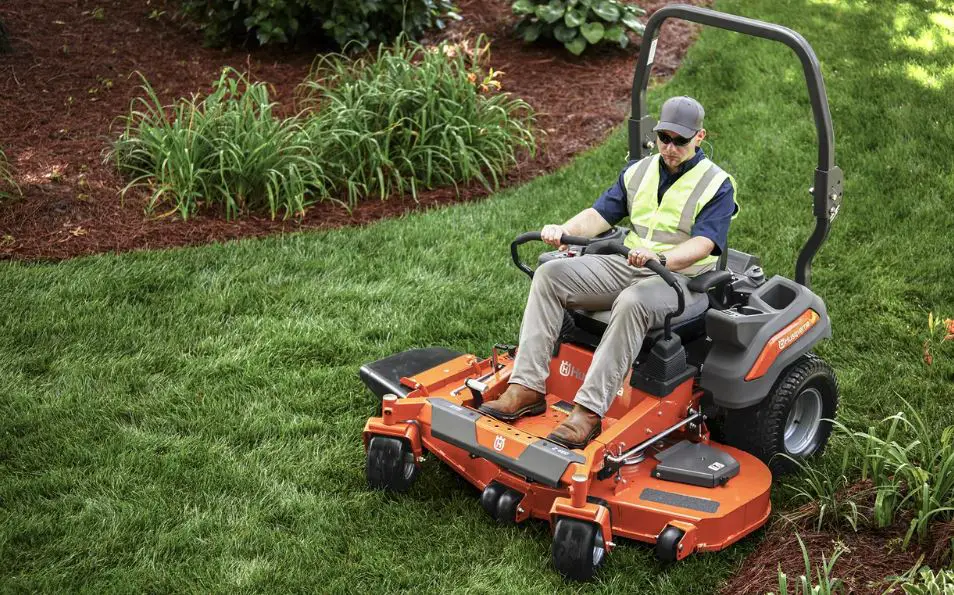
If you have ever watched the groundskeeper of your alma mater trim the football field or a neighbor on a riding mower turn and maneuver with ease, then you have more than likely seen a zero turn lawn mower in action.
A zero turn lawn mower is just what it sounds like: a riding mower with a zero turn radius. The advantage of this capability is that they can pivot in place which means you can change directions without having to back the mower up.
A zero turn mower will always be a riding mower and they will always have two front wheels that swivel in 360 degrees – that’s part of what allows them to turn in place.
And the reason you have likely seen them being used on large fields and properties is because they excel at tackling large mowing jobs in a short amount of time.
Think about it: with a mower that can turn in place, you can reach one end of your lawn and simply turn around to mow a line right next to the one you just made.
Zero turn lawn mowers are fast, efficient and they help you get around obstacles and lawn features.
So why would anyone buy anything else? Well as it turns out, there are a handful of very good reasons why one might steer away from a zero turn mower – see what we did there?
In the following article, we will be going over the key disadvantages of zero turn mowers, highlighting some other mower options, talking about who could benefit from a zero turn mower and basically going over everything you need to know if you are considering buying one.
So let’s get started!
Zero Turn Mower Overview
“Zero turn mowers are certainly handy for large properties or ones with many obstacles in the way. However, the consumer must make careful considerations before buying one. That’s because they can be very expensive and depending on the terrain, they can perform poorly.”
How Do Zero Turn Mowers Work?
Actually, the way that zero turn mowers work is very simple.
It all starts with the two front wheels. Instead of being fixed like most mowers, the front wheels of the zero turn mower can swivel 360 degrees.
Then the drive system comes into play. The rear wheels are able to operate independent of each other in order to push one side while the other side remains in place.
For example, if you wanted to turn right on a zero turn mower, your right/rear wheel would essentially remain static while the left/rear wheel would rotate.
The front wheels pivot accordingly and the whole machine is able to rotate in place without having to back up and make multiple point turns.
What Are the Different Types of Mowers to Consider
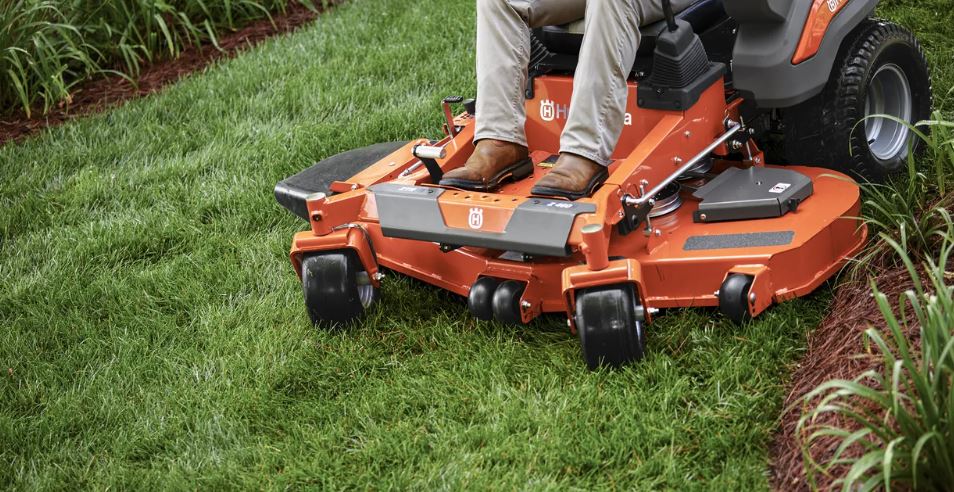
- Push Mowers – These are very common mowers as they are inexpensive and work well for small yards. They require you to push them along, hence the name.
- Riding Mowers – Riding mowers are ones that have drive systems that allow the operator to control the mower from an operator seat. All zero turn mowers are riding mowers; but not all riding mowers are zero turn mowers.
- Lawn Tractors – Lawn tractors are similar to riding mowers. However, they can be converted with accessories and kits to plow snow, throw snow, carry agricultural equipment or carry out other lawn/gardening tasks.
- Self-Propelled Mower – A self-propelled mower is a type of push mower that can pull itself along via an auger. These are easier on the body than a straight-up push mower.
Disadvantages of Zero Turn Mowers
Before we start running down the list of disadvantages, it’s important to keep in mind that there are indeed important advantages to these kinds of mowers – in fact we will be going over those as well.
But for now:
They Struggle on Hills
– Remember that the two front wheels have to pivot freely so no zero turn mower will be 4-wheel drive. This is a disadvantage if you have steep hills on your property as a zero turn mower will struggle with stability on them.
Limited Traction in Wet Conditions
– Zero turn mowers also struggle to gain traction when the ground is wet. The nature of the front wheels and drive system leaves these mowers vulnerable in wet conditions.
Hard to Master
– Even if you have experience with riding mowers, mastering a zero turn mower can be difficult and may take time. There are more foot pedals and hand controls.
Lack of A Brake Pedal
– Most zero turn mowers don’t have a traditional brake pedal which can make it even harder to operate safely.
More Complex Options
– Zero turn mowers are often loaded with advanced features that you may not be familiar with. It can be difficult to sort through the features that you need and those that you don’t.
Limited Utility
– If you are looking to haul equipment, plow snow or carry out other outdoor tasks, don’t look to a zero turn mower. Outside of mowing, they have virtually no use.
Inefficient with Fuel
– Zero turn lawn mowers tend to consume a lot of fuel – partly because they are used for large jobs.
Not Great with Detailing
– If you need to add finishing touches to a precision mowing job, you will still need hand tools.
Cost
– Zero turn mowers tend to be some of the most expensive in terms of upfront cost and
Common Zero Turn Mower Problems
In addition to the inherent disadvantages that we just detailed, there are also some “down the line” problems that consumers tend to have with these machines.
Ignition Issues
– The ignition coil is responsible for generating the spark that initiates the combustion that starts the engine. Zero turn mowers are notorious for having faulty ignition coils and can fail to start over time.
Clogged Mufflers
– Zero turn mowers also tend to have issues involving clogged mufflers.
Emissions
– Of course, as most zero turn mowers are gas-powered, there is concern about their emissions. Zero turn mowers usually have larger motors too so they tend to produce more pollutants.
Possible Dangers
As if all that weren’t enough, zero turn mowers can actually pose a safety threat to the operator.
As we have already mentioned, these types of mowers don’t provide great traction in wet conditions and they can be unstable on hills – meaning that they can actually slip and tip over on hills.
This is especially true on wet hills.
Zero Turn Vs Push Mowers
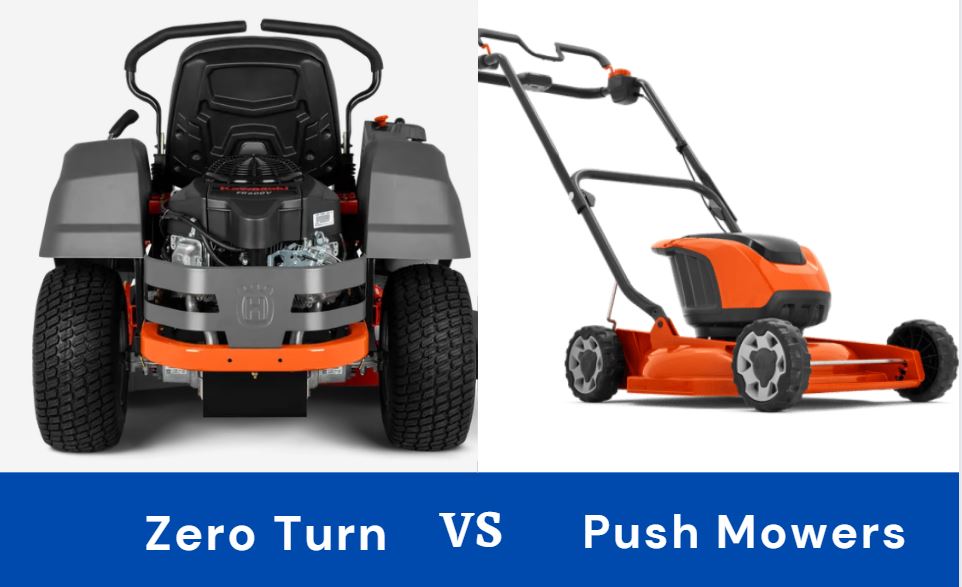
Zero Turn Pros:
- Quicker mowing
- Easier on the body
Zero Turn Cons:
- More maintenance
Push Mower Pros:
- More affordable
- Suitable for small lawns
Push Mower Cons:
- Harder on the body
Zero Turn Vs Riding Mowers
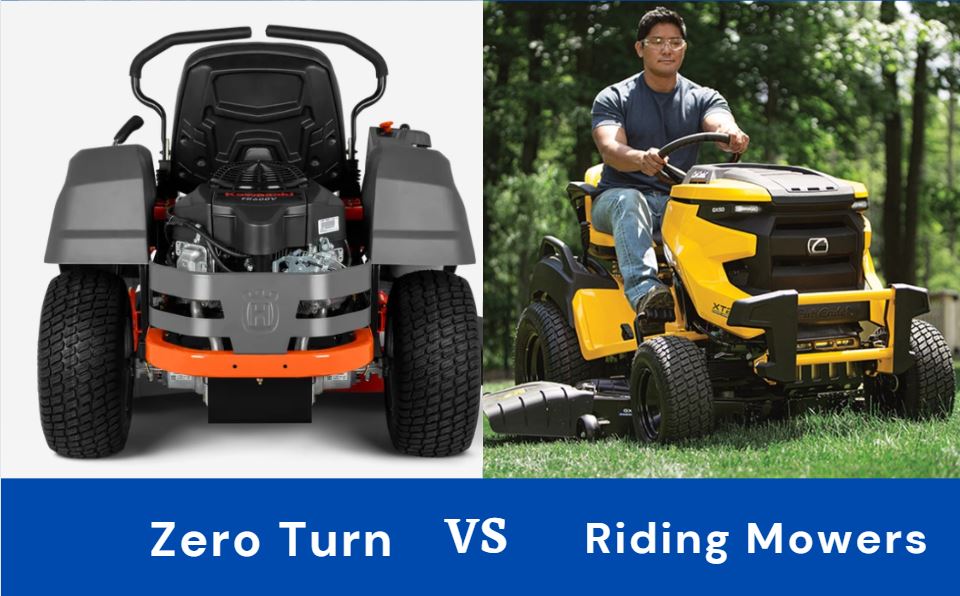
Zero Turn Pros:
- Quicker mowing
- More maneuverable
Zero Turn Cons:
- More expensive
Riding Mower Pros:
- More affordable
- 4-wheel drive options
Riding Mower Cons:
- Less agile
Zero Turn Vs Tractors
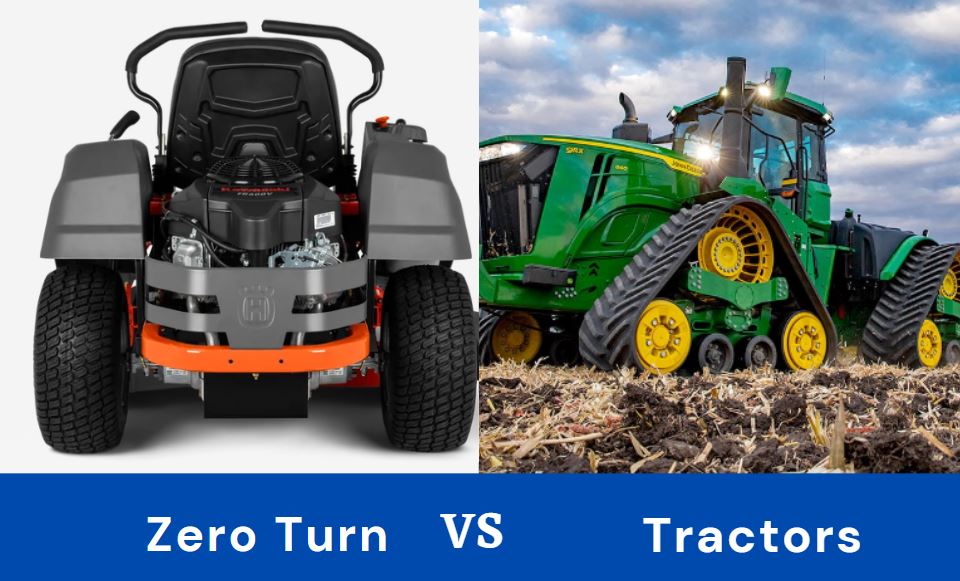
Zero Turn Pros:
- More maneuverable
- No need for accessories
Zero Turn Cons:
- Can only be used for mowing
Tractor Pros:
- They can move snow
- Great for farms, ranches and vineyards
Tractor Cons:
- Accessories can be expensive
Zero Turn Vs Self-Propelled Mowers
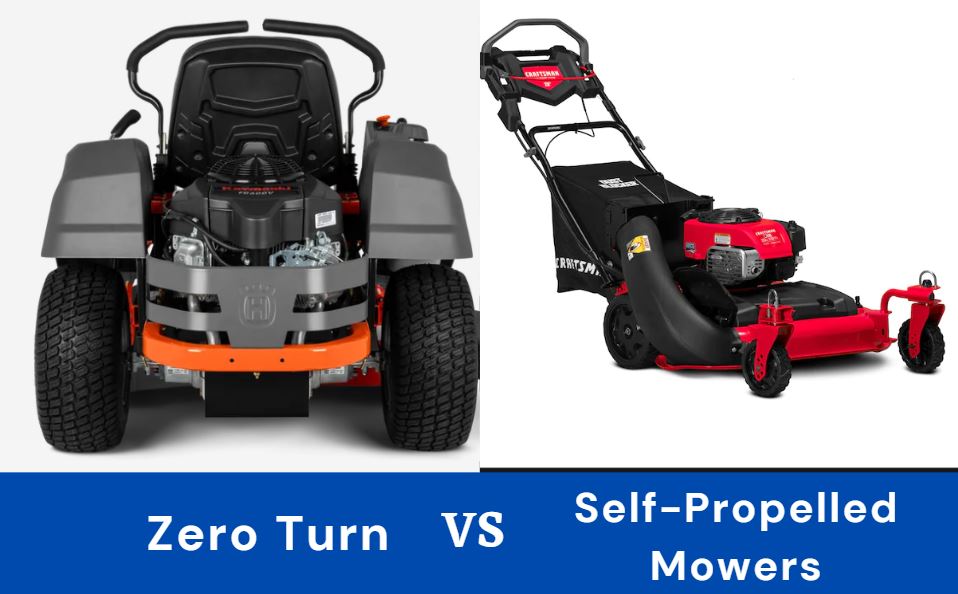
Zero Turn Pros:
- Better around obstacles
- More comfortable
Zero Turn Cons:
- More maintenance
Self-Propelled Mower Pros:
- Easy on the body
- Suitable for small properties
Self-Propelled Cons:
- Limited features
Pros of Zero Turn Mowers
- Mowing Speed – Zero turn mowers allow for tight turns which means more efficient mowing that can cut your mowing time in half.
- Precise Cutting – Especially for larger properties, zero turn mowers allow for crisp lines and precision cutting.
- Comfort – As a riding mower, a zero turn lawn mower can be much more comfortable than a push mower or even a self-propelled walk-behind mower.
- Close Cuts – A lot of zero turn mowers have adjustable cutting deck heights that allow you to cut close to the turf.
- Better Steering Ability – Once you get the hang of your zero turn mower, you will likely find that they are much easier to steer and handle than a standard riding mower.
Are Zero Turn Mowers Worth Buying?
Yes and no.
If you have a large property to mow, want to save time and already have all the other outdoor equipment you need (tractor, snow blower etc) then a zero turn mower would probably be worth it for you.
On the other hand, you should not even consider a zero turn mower if you have less than half an acre of land to mow.
They are also expensive so if you don’t have a vast budget for lawn equipment, they may not be worth the upfront cost.
Who Should Buy Zero Turn Mowers?
Zero turn mowers would be ideal for anyone who has 1.5 acres or more to mow.
Even more so if that acreage has a lot of trees, hardscapes, fences and other obstacles to get around. Also, you should only buy a zero turn mower if most (if not all) of your property is flat.
What Size do you Need?
- Entry-level (18-22HP) – Best for 1-acre properties
- Mid-Grade (18-26HP) – Best for 1.5-acre properties
- Semi-Pro (23-24HP) – Best for 2+ acre properties
- Commercial (23-31HP) – Best for commercial use
The Best 3 Zero Turn Mowers
John Deere Z365R
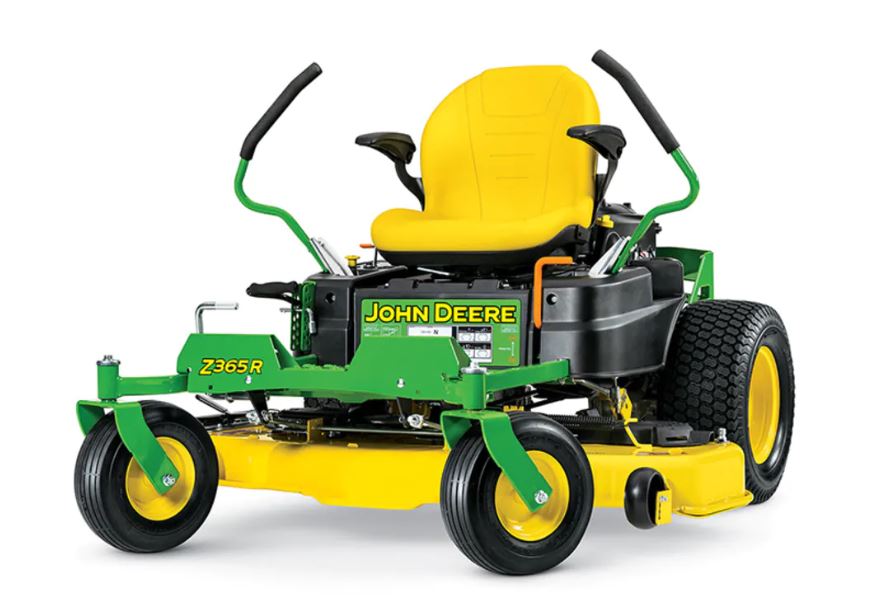
The John Deere Z365R has a 48” cutting deck and a 24 HP engine so it would be great for mid-sized properties.
What we really like about this mower is that it is really easy to change the oil – even if you don’t have tools.
The frame is very durable and will protect the motor season after season. Plus it’s a John Deere so you know it will be reliable. Our only gripe about this mower is that the seat isn’t very comfortable.
The back rest is rather short so you don’t get very good lumbar support.
Pros
- It comes from a very reputable manufacturer
- It has a max forward speed of 7 MPH
- Full-pressure engine lubrication
Cons
- Not the most comfortable zero turn mower
Overall Score: 94/100
Check Out More Reviews Here:
Husqvarna Z254F
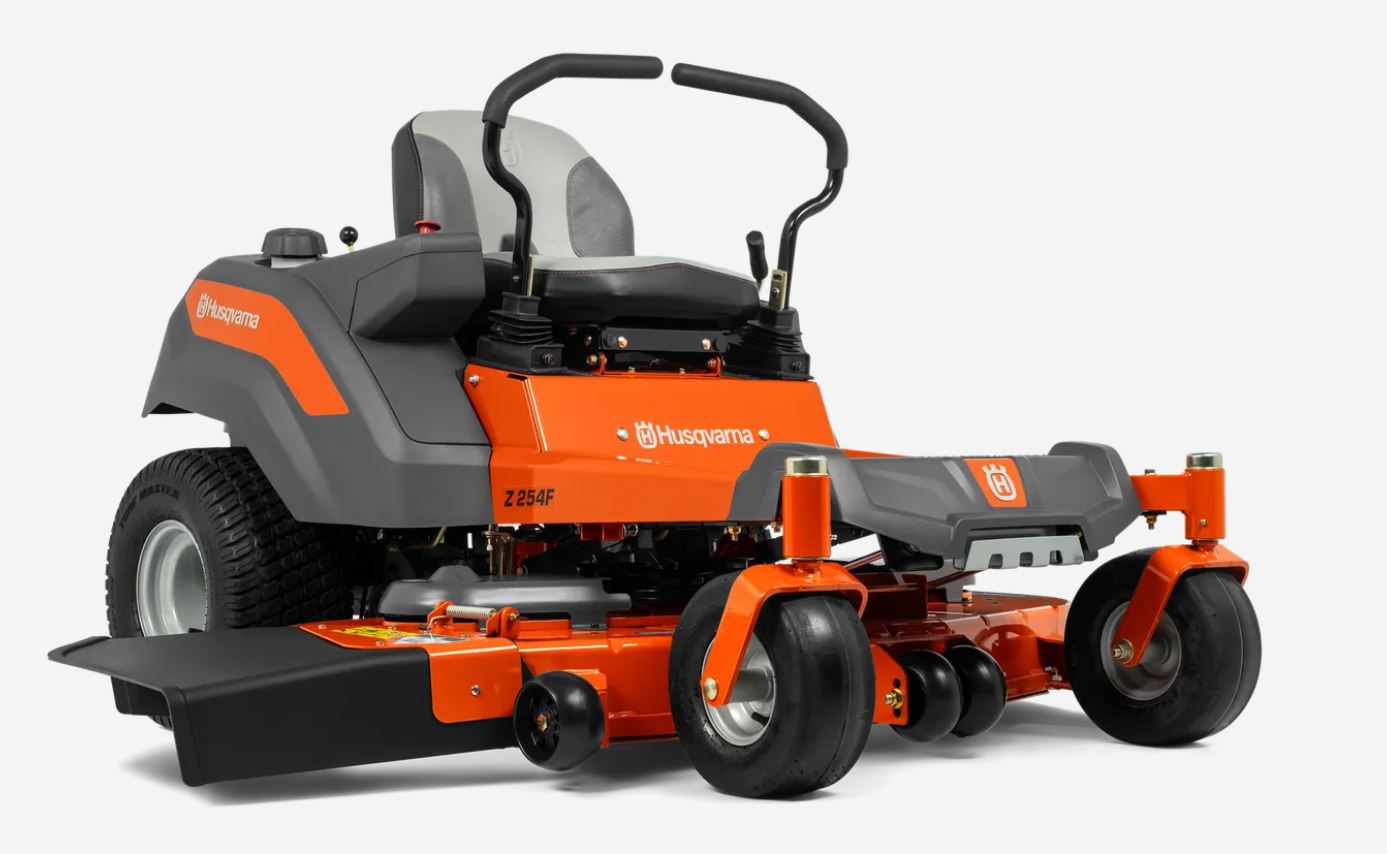
The Husqvarna Z254F has a 23HP engine that is capable of a max forward speed of 6.5 MPH.
It also features three blades that cut grass very evenly. The cutting deck can be adjusted to a max height of 4 inches and minimum height of 1.5 inches.
The deck is made of 10-gauge steel so it can handle rugged terrain and should last season after season. You can also use the Husqvarna Z254F as a side discharge, bag collecting or mulching mower.
The cutting width of the deck is 54 inches.
Pros
- Built to last
- The cutting deck is nice and wide
- Comfortable seat
Cons
- No nose roller
Overall Score: 95/100
Check Out More Reviews Here:
Cub Cadet Ultima ZT1
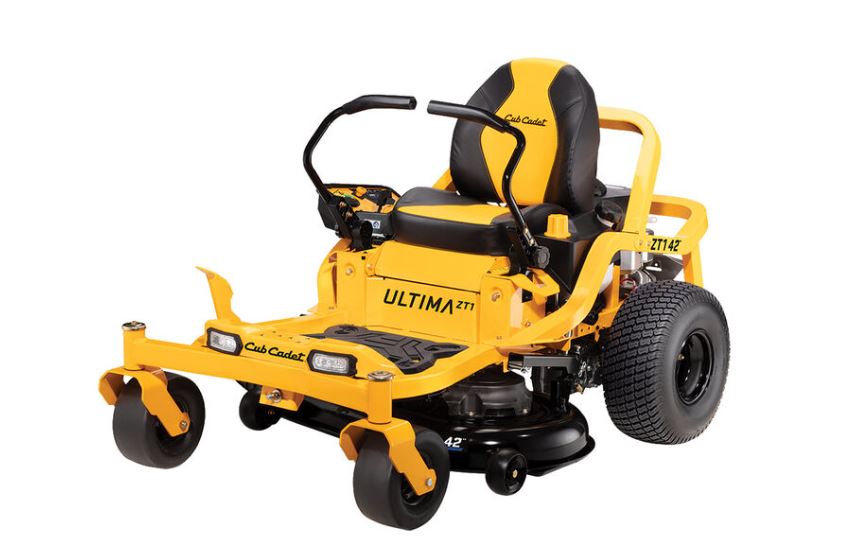
The Cub Cadet Ultima ZT1 is a gas-powered, zero turn lawn mower that is perfect for mid to large lawns.
It has a 726cc Kawasaki engine that is capable of forward speeds of up to 7 MPH and reverse speeds of up to 3.5 MPH.
The cutting deck is 50 inches wide and can be set in 15 height positions that range from 1” to 4.5”. The Cub Cadet Ultima ZT1 also features hydrostatic drive which means you don’t have to shift to change speeds.
It accelerates, turns and cuts very smoothly. It would be a great choice if you have never operated a zero turn mower before.
Pros
- Easy to get the hang of
- Easy to adjust the deck height with the foot pedal
- Features LED headlights
Cons
- No armrests
Overall Score: 95/100
Check Out More Reviews Here:
Zero Turn Mower FAQ’s
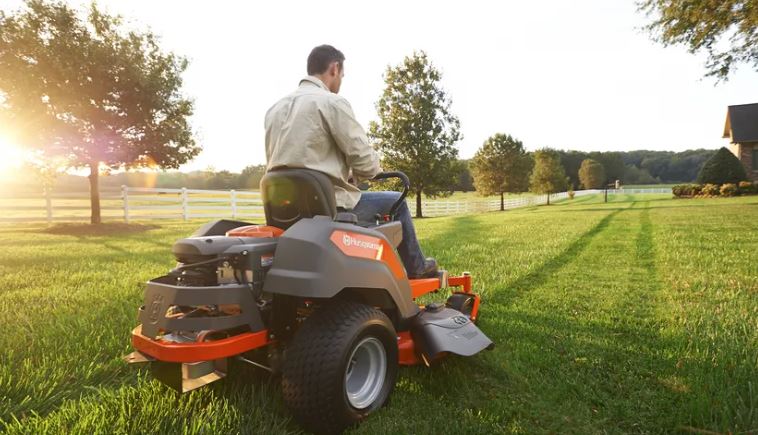
How do I choose a zero turn mower?
The first thing you should consider is the size of your property.
The size of your property should dictate the size of the mower you buy (see our above guide as a reference). Second, you should get one that fits your needs.
For example, if you want a mower that can produce mulch, you will need a mulching zero turn mower.
How do you drive a zero turn mower without tearing up grass?
The best way to ensure that you don’t cause turf damage when turning your mower is by raising the deck height before you make a turn.
How long will a zero turn mower last?
This will depend on the make and model and how well you maintain your mower.
However, the general rule of thumb is that most zero turn lawn mowers will go for about two-thousand hours of operation before they need any major repairs.
It should also be noted that how you store your mower is also important. Try to keep it indoors, in a cool dry place.
Can a zero turn mower flip over?
Only if you are not careful with it. Remember that zero-turn mowers are not 4-wheel drive mowers and you should not use them on steep hills.
If you use them on steep hills (about 15 degrees or greater), they can slip and turn over. That’s why you should stick to flat terrain when operating a zero turn mower.
How fast can you mow with a zero turn mower?
That will depend on the make and the capacity of the engine. The HP (horsepower) of the motor will determine how fast the mower is able to go. There are some larger engines that can propel mowers 8 MPH.
It’s also important to note that zero turn mowers will have different speeds for their forward and reverse modes.
Reverse speeds will always be slower than forward speeds. The average zero turn mower will have a reverse speed of about 3 MPH.
How long does it take to mow 1 acre with a zero turn mower?
Most of that will depend on the width of the cutting deck. For example, a zero turn mower with a 46 inch cutting deck will mow an acre in 17-23 minutes.
On the other end of the spectrum, a zero turn mower with a 66 inch cutting deck will mow an acre in only 12 minutes.
Can a zero turn mower cut tall grass?
In general, a zero turn mower will be good for cutting grass as tall as 4-5 inches. Anything longer than that, the mower will have trouble; but that is the case with most kinds of mowers.
Can zero turn mowers handle rough terrain?
In general, zero turn mowers aren’t really built for tough or hilly terrain. They can struggle with uneven terrain and may even become damaged going over rocks and mole hills.
Final Assessment
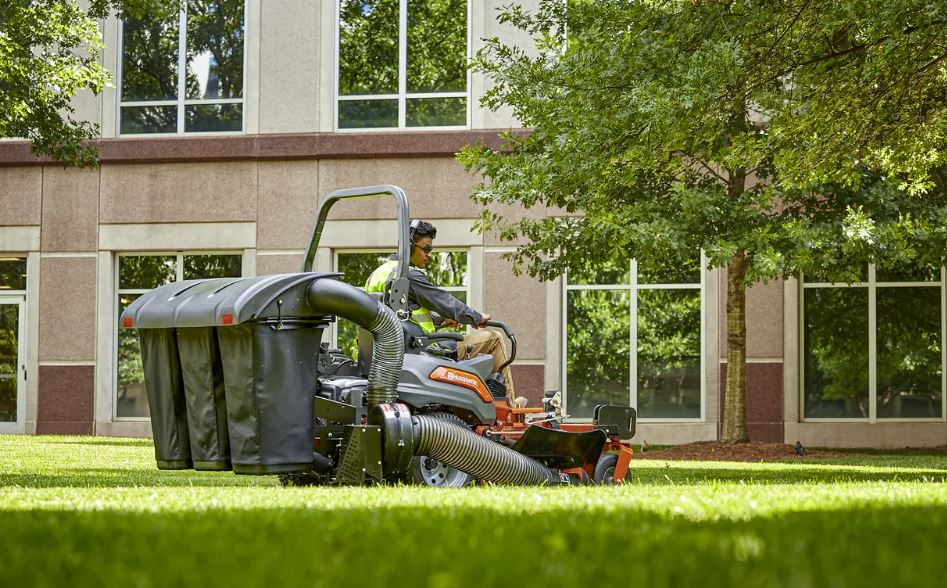
So are zero turn mowers worth the money?
Only if you have mostly flat terrain, a large property and don’t need them to perform any other tasks aside from mowing.
Also, keep in mind that they usually have a high upfront cost compared to regular riding mowers and will require varying degrees of maintenance (annual oil changes at minimum).
If your needs meet all those criteria then by all means, check out some of the zero turn mowers we curated for this article.



